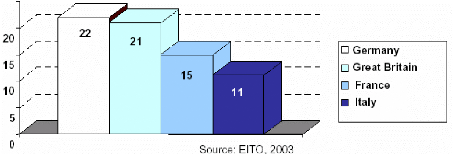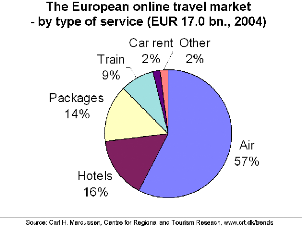1. General context
1.1 Economic importance of the sector:
Tourism is one of the most important sectors in the European
Union. Five EU countries were among the 10 leading tourist destinations in the
world in 2000, and in 1999 the EU accounted for 43% of arrivals and 40% of
receipts in non-domestic world tourism. In addition, Tourism is one of the
fastest growing sectors in the European economy.
1.2 Weight of the SMEs in the sector:
The tourist industry is heterogeneous and fragmented. It
involves many different players, both private and public. Small and
medium-sized enterprises (SMEs) play a very important role in European tourism,
with over 99% of firms employing fewer than 250 individuals. In 1997, tourism
SMEs represented 7.4% of total SMEs in Europe. 6.5% of the total turnover of
European SMEs is generated by tourism SM Es.
1.3 Online travel sales in Europe:
E-business has a major impact on the tourism sector, not only
by redefining the organizational structure and working procedures of the
individual enterprise, but also by changing the relationship with partner
organizations. Online travel sales increased by as much as 36% from 2003 to
2004 and reached 17.0 billion euros in the European market in 2004- or 7.1% of
the market (up from EUR 12.5 bn. or 5.3% in 2003).
A further increase of about 23% during 2005to about EUR 21.0
billion may be expected (8.6% of the market). The European online travel market
could reach EUR 24.9 billion. or 10.0% of the market by 2006. The UK accounted
for 36% of the European online travel market in 2004, with Germany in second
place at 22%, a little up from 2003. The ten new EU member countries have been
included in the European online travel market and contributed a little under 2%
to the total in 2004, after growing quickly during 2004. The direct sellers
accounted for 64% of online sales in the European market in 2004, marginally
less than in 2003.
Leading Position in Shares of the ICT Market in
Europe1

1 European Information Technology Observatory The Evolution in
European E-conomy, EITO, May 2003
In 2004 the breakdown of the market by type of service was as
follows (with 2003 in brackets): Airtravel: 57.4% (57.1%); Hotels 15.8%
(15.0%); Package tours 14.4% (15.7%); Rail 8.7% (8.3%); Rental cars 1.9%
(1.8%); Other services: 1.9% (2.1%). Concentration in the European online
travel market has increased, following several acquisitions. E-business has a
major impact on each part of the value chain, from service providers to
intermediaries.

1.4 Internet users profile
E-Customers are becoming more and more accustomed to the use
of new technologies. They are also able to use a more dynamic tool to contact
suppliers directly, to choose travel destinations, to obtain on-line travel
information, to compare prices, and to proceed to online booking and
purchasing. Consumers can interact online in specially designated areas created
by the electronic intermediaries to exchange views and travel experiences and
to publicise travel reviews.
According to the studies conducted by eTForecasts in 2001,
Internet users tend to be wealthy, well educated and interested in independent
travel. The Internet user relates very well to some or all of the target
markets of many destinations. However, we must consider that the growing number
of Internet users and the increase in the use of new access channels (e.g
television and mobile devices) the user profile will change , broaden and
become less up market. It is already the case in the United States as a very
high proportion of proportion of people traveling internationally is internet
users. It seems that it is going to be the same for the other major markets in
the next two or three years.
According to Jupiter Research62, the number of
internet users in Europe will reach 212 million by 2008, up from 142 million
users in 2002. Jupiter Research believes that at the end of 2008, the
disparities in Internet household penetration rates between the more
technologically sophisticated Nordic countries (Sweden, Norway, Denmark and
Finland) and the rest of Europe will have narrowed compared with 2002. The
average penetration rates for the three key regions (i.e., Nordic Europe,
Northern Europe, and Southern Europe) will vary by just 15% in 2008 compared
with a variation of 25% in 2002. (Jupiter Direct, 10/2003).
2 Jupiter Research Report, The European Online Population
Through 2008, October 2003
| 


